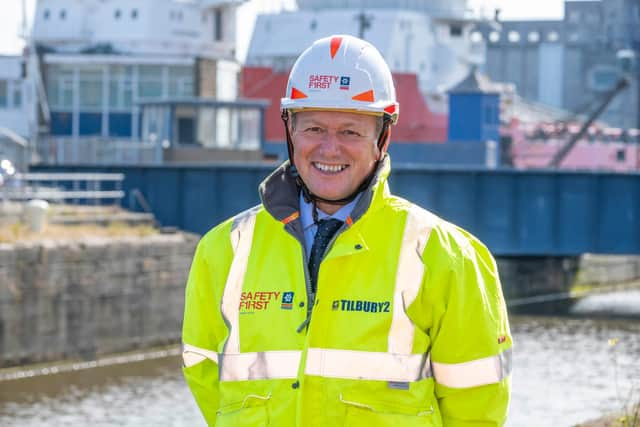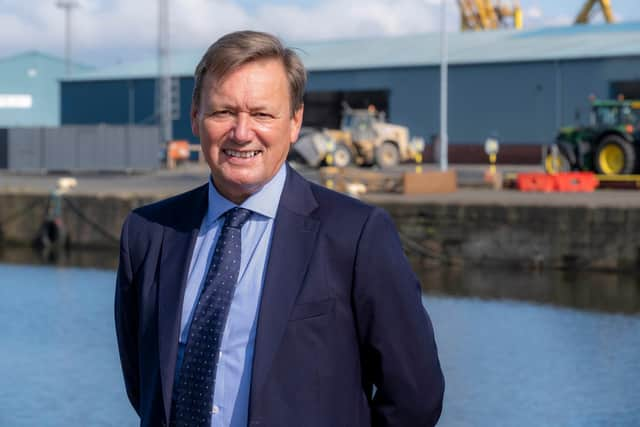The Big Interview: Forth Ports CEO Charles Hammond
It owns and operates eight commercial ports in the UK – Tilbury on the Thames, Dundee, and six on the Firth of Forth – Leith, where the organisation is based, Grangemouth, Rosyth, Methil, Burntisland and Kirkcaldy.
Forth Ports, which was established in 1967 as a port authority, has outlined its aim to create Scotland’s largest and best-located renewable energy hub on on a vast site at the Port of Leith, for example, while it recently revealed plans to conserve and restore the Category A listed Victoria Swing Bridge in Leith.
Advertisement
Hide AdAdvertisement
Hide AdMr Hammond has held many different roles in addition to Forth Ports, including having been a member of the Cabinet Secretary’s 2020 Vision for Health & Social Care, formerly serving as chairman of both SpaceandPeople Group, and Scottish Enterprise Edinburgh, and currently chairing the United Kingdom Major Ports Group, for example. He was awarded an OBE last year for his services to the UK ports industry and business in Scotland.


This year marks the 20th anniversary of you becoming CEO of Forth Ports. How have your role and the organisation adapted over that time? What are your key goals?
Forth Ports today is significantly larger than it was 20 years ago. We’re very involved in what have become complex supply chains and emerging low-carbon industries and we’re much more conscious of the local communities in which we’re doing business. The organisation has grown very much through private investment but also through acquiring new skills, and decision-making is much more data-driven than it was 20 years ago.
The fundamentals of shipping and trade are still there but add to that the higher skill base, more digital sophistication, greater capital intensity and higher productivity.
Ports are great enablers because we have the visibility to see value being added to goods and to make connections between shipping lines, producers, distributors, forwarders and customers overall. Ports are facilitators for trade, for the export and import of goods, and, importantly, for the transition to net zero.


You described 2020 as the “most challenging year” the business had ever faced – buffeted by Covid and Brexit – while also drawing attention to the role ports have had in transporting, say, medicines and food during the pandemic. What is your view on how Forth Ports has navigated post-March 2020 waters?
I think we’re seeing the early stages of recovery but trading patterns have still to establish themselves, particularly for the long term. We really found our purpose in keeping the economy moving, making sure that essential goods got to their destinations and keeping the operations flowing through what were very difficult lockdown periods.
And we’ve come through that with a renewed sense of culture and purpose, and a willingness not only to invest but to play a leading role in the recovery as well as keeping the basics of the economy moving.
Advertisement
Hide AdAdvertisement
Hide AdWe didn’t furlough a single employee during the pandemic, and that was a conscious decision. We kept everyone together. Things were uncertain but we were determined that everyone should have a job and could continue to earn while we kept those essential goods moving over the quayside.
We’ve learned a lot about resilience and about how efficiency can help to drive down our carbon-production. Now is the time to start changing behaviours and patterns and to invest in a net-zero future so that we have a future for further generations. We’re hoping to lead in our area of operations on creating that narrative on how we might transition to net zero and the steps we can take as facilitators.
Forth Ports has outlined its aim to create a Greenport Hub and Green Growth Corridor at the heart of Scotland that "delivers a just and practical energy transition” to help meet the UK and Scottish governments’ net-zero and energy-transition targets. Can you give more details on this and your broader green and sustainability efforts?
Forth Ports’ vision is to create a Greenport Hub and Green Growth Corridor, and we’ve announced a privately funded £40 million renewable energy hub at the Port of Leith to create industrial jobs through the creation of a green energy centre of excellence in manufacturing.
But more than that, I want to see us mobilise the whole of Team Scotland, collaborating to create high-quality, green energy jobs that will enhance the whole of Scotland’s Central Belt industrial powerhouse while tackling deprivation in the communities around our ports, contributing to the levelling-up of the large industrial areas in our coastal communities.
Our land and facilities in central Scotland are home to the largest remaining industrial cluster north of the Border. As is the case in large coastal industrial areas around the whole of the UK, they must play a vital role in facilitating the country’s net-zero and energy-transition ambitions.
Our ports represent Scotland’s most strategic economic hub and deliver Living Wage jobs across the whole of central Scotland with 70 per cent of the population north of the Border, as well as the cities of Edinburgh, Glasgow, Dundee, Perth, and Stirling all within a one-hour journey.
And for every job that’s created in a port, eight to ten posts are created elsewhere in the economy. Our ports have a major role to play in energy transition and we’re determined to see that become a reality.
Advertisement
Hide AdAdvertisement
Hide AdThe organisation says half of Scotland’s GDP goes through the organisation’s ports and estuaries. Do you still believe ports make an “underlying and unsung” contribution to the economy?
Partly because of the pandemic, people and the government have now recognised the essential nature of trade. It’s not just about prosperity, it’s also about resilience and ensuring that people have the basics they need for modern-day living.
For me, that contribution is now being recognised more, and so when investments are announced in the ports sector they should be welcomed and built upon because they will create that prosperity, but they will also create resilience and those investments will also pave the way towards net zero.
Can you explain more about your involvement in work to help local communities?
As a group we focus heavily on skills-development for not only our business, but the local community as well. In Tilbury we have a bespoke Training Academy and in 2019 we opened a dedicated Training Centre in Grangemouth – our biggest Scottish port.
A career in logistics can benefit people of all ages and backgrounds. We are part of The Tilbury on the Thames Trust which provides free training opportunities for ex-military personnel as well as people from the local community.
In Scotland, we have this month formally established The Leith Trust Fund, which, when launched later this year, will provide funding to support the work of local charities in this area of Edinburgh, with particular emphasis on projects tackling isolation or loneliness.
We were pleased to have been able to seed fund the Trust with a contribution of £200,000 and I am personally speaking to other businesses in the area to support and contribute to this important community fund.
Advertisement
Hide AdAdvertisement
Hide AdYou were last year awarded an OBE for services to the UK ports industry and business in Scotland, and honoured at the 2018 EY Entrepreneur Of The Year awards in the Transformational Leader category, for example. How do you feel about these accolades – and what approach to do you take to leadership?
I regard these awards as a reflection of the success of the business and the people that work across the group. The entrepreneurship recognised by the EY award is very much to me an acknowledgement that we have a workforce of entrepreneurs and problem-solvers on the quayside who are dealing with changes in shipping and supply chains on a daily basis so, to be given that award recognises that we have that culture running through the whole company.
In terms of the OBE, I personally found that quite humbling because of the efforts that so many essential workers have gone to during the pandemic and the sacrifices they’ve made.
I think leadership is about making sure things are always moving in the right direction; that you’re capable of creating and motivating great teams around you; and that you give people the freedom and the ability to make decisions at the right level and the confidence to do that.
The essence of good leadership to me is removing your own ego, and always striving for the best decision for the business, which can often come from collaboration. The best ideas come from the most unlikely places.
It has been important, particularly in lockdown, to get round the business and talk to as many people as possible, and listen to their stories. But when you do the job I do, it really doesn’t do to take yourself too seriously. You know when people laugh at your lockdown long hair that you’ve got the culture about right because they feel free to do that.
What would you like Forth Ports to look like in say 2027 – the year of its 60th anniversary – both in Scotland, and more broadly?
I’d like to see the business building on its success today through more investment and creating jobs and happy contented people who are well-rewarded for what they do and seeing Forth Ports as one of the best companies to work for across the UK.
A message from the Editor:
Thank you for reading this article. We're more reliant on your support than ever as the shift in consumer habits brought about by coronavirus impacts our advertisers.
If you haven't already, please consider supporting our trusted, fact-checked journalism by taking out a digital subscription.
Comments
Want to join the conversation? Please or to comment on this article.
